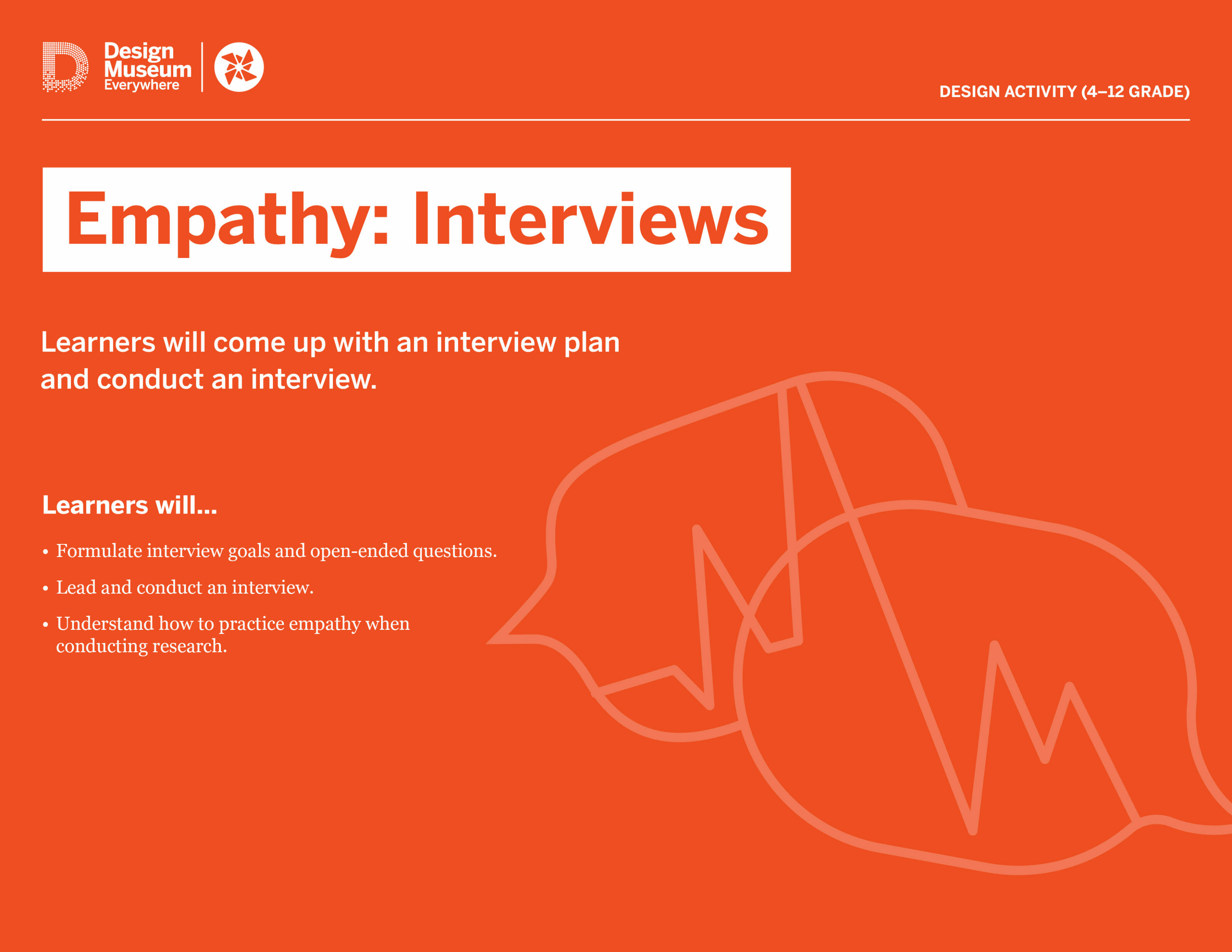Empathy: Interviews
Design Activity (4-12 Grade)
Learners will come up with an interview plan and conduct an interview.

Learners will…
-
Formulate interview goals and open-ended questions
-
Lead and conduct an interview
-
Understand how to practice empathy when conducting research
Share your interview plans on social media with #DesignTogether and we’ll feature examples in our Design Together online gallery.
INSTRUCTIONS
-
Before starting, gather a few materials to have your interview. You will need pen, paper, or a recording device.
-
Begin by discussing what empathy interviews are, and why they’re important (see background).
Sample Questions: What is an interview? What do you think an empathy interview is? How might you empathize with your interviewee? -
Create an interview plan with your learner by first choosing a topic. Some suggestions are: grocery shopping, online learning, listening to music.
-
Once a subject has been chosen, think about interview goals: what does your learner want to know as a result of the interview? For example, if your subject is grocery shopping, one goal might be to see how people decide on the items they buy.
-
Now that you have a subject and goals, it’s time to come up with a question guide! Before writing any questions, talk with your learner about how to write questions for an empathy interview (see empathy interview tips).
Sample Questions: What is an open-ended question, and why are they important for empathy interviews? What are some things you can do in the interview to encourage your interviewee to tell a story and learn more about them? What are some things that might make it difficult for your interviewee to tell you about themself, and how can you make sure to avoid them? -
Have your learner write at least five questions for their interview, keeping their subject and goals in mind. Remind them that this is a guide, and they can ask additional questions during the interview if needed.
Once your learner has finished writing questions, encourage them to go through the questions once more to look for ones that might be restrictive or not open-ended, and edit them. -
Once your learner feels ready to interview, have them find an interviewee and (if possible) a notetaker. If having a notetaker is not possible, your learner can choose to either take the notes themself or use a recording device.
-
Have your learner conduct the interview! When they are done, discuss the results with them. What new things did they learn about the interview subject/interviewee? Have any of their thoughts or views changed, and how? What did they want to know more about as a result of the interview? How did they feel conducting the interview, and how might they improve their questions/plan/goals for another one?
-
For older students: Have them conduct at least four more interviews, and then compare the notes from all five interviews. Is there anything they see mentioned multiple times? What are some major themes that are seen across all five interviews?
WHAT ARE EMPATHY INTERVIEWS?
Empathy is the practice of seeking to understand and make connections with all types of people. Interviewing for empathy means prompting and listening to a person’s stories in order to get to know their thoughts, feelings, and motivations on a specific subject. Empathy interviews are important in understanding a person’s behavior and choices so that you can learn about their needs and wants and design to incorporate them. There are usually three roles in an interview—the interviewer who asks the questions, the interviewee who answers them, and the notetaker who writes down everything that happens. The notetaker ensures that the interviewer can have their full attention on the interviewee. However, if there’s no notetaker, then interviewers can either record the interview or take the notes themselves.
EMPATHY INTERVIEW QUESTIONS
Ask open ended questions. Use questions that will encourage a story from the interviewee rather than a yes or no answer. For example, “Tell me about a time when…” or “Show me how…”.
Avoid “leading questions”, or questions that use language that will influence the interviewee to answer in a certain way (ex. “normally”, “obviously”, “you know”).
Always try to probe deeper. For example, if a person says “I really love fish” ask “Why?”
Make sure your interviewee is comfortable! This can be anything from checking in regularly throughout the interview, to choosing a cozy environment. Always ask permission before doing things that might invade their privacy, such as taking videos or recordings or asking personal questions. In addition, make sure to introduce yourself and the project at the start of the interview so your interviewee is aware of what is going on.
Reserve personal opinions and judgments. Try to keep an open mind, and focus on listening to what the other person has to say. If you don’t understand what they’re saying, ask them to explain it in more detail.
